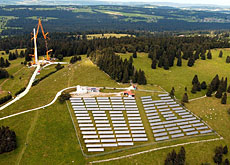Fragmented cleantech sector “needs shake-up”

Switzerland's developing cleantech industry needs to be better organised and start-ups should be more focused to keep pace with global competitors, experts agree.
A new umbrella group is attempting to bring a multitude of firms under one roof to better utilise Swiss manufacturing know-how in the drive to generate environmentally friendly innovations.
The Swiss Cleantech Association will formally launch on Monday.
A recent government survey estimates that the Swiss cleantech industry directly employs some 155,000 people and generates up to SFr20 billion ($19.96 billion) for the economy. Firms range in size from giants, such as ABB and Oerlikon Solar, to small start-ups.
But the fragmented nature of the sector and a perceived lack of coordinated government strategy has led many critics to believe it is not achieving full potential in terms of current profits and future growth potential.
Economics Minister Doris Leuthard launched an initiative last month to coordinate cleantech exports and provide some funds to help start-ups produce business plans. The new Swiss Cleantech Association is also gathering companies to act as a lobby group for the industry.
In contrast to other business lobby groups, the organisation has called for more government intervention and regulations to give cleantech a boost in Switzerland.
Cleantech is a term used to describe knowledge-based products or services that improve operational performance, productivity or efficiency while reducing costs, inputs, energy consumption, waste or pollution.
To subsidise or not?
“Targets are no good on their own. They need to be supplemented by enforceable regulations that reward clean companies over dirty ones,” Swiss Cleantech Association president Nick Beglinger told swissinfo.ch. “If companies get used to local regulations, it would give them the edge when they export.”
The association is more in favour of tax breaks for environmentally friendly companies than general subsidies for the entire industry.
Think tank Avenir Suisse is also against the type of national subsidies for cleantech industries that have proved so successful in countries such as Germany or Japan.
“The Swiss domestic market is too small for such subsidies. There would not be enough local demand to make them work,” energy and infrastructure project manager Urs Meister told swissinfo.ch.
He also argued that some of the subsidy cash would likely be transported abroad if companies opened up facilities in other countries. In addition, the industry might become reliant on such incentives only to come unstuck when fiscal aid ran out.
Better to “free ride” subsidies in other countries by providing products and services in bigger markets abroad, Meister added.
“Subsidies in Europe are more important to Swiss companies than subsidies in Switzerland,” he said.
Lack of private equity
But while Switzerland has scored notable successes in the global cleantech arena through its multinational manufacturing giants, there is a distinct shortage of innovative start-ups making their mark.
Swiss-based venture capital firms are pouring cash into start-ups abroad, but are finding a paucity of projects in Switzerland.
Gina Domanig of Zurich-based Emerald Technology Ventures told swissinfo.ch that many Swiss ideas get rejected simply because the business plan is not strong enough.
“In Switzerland, start-ups often consist of technology students and a few friends who underestimate the market, the challenges and the skill sets they need to succeed,” she said. “In other countries it is usual to see entrepreneurs team up with experienced marketing professionals and build up a strong management team.”
Domanig is in favour of more federal or local incentive schemes to stimulate the local market and attract foreign firms.
However, Nick Beglinger believes the cleantech start-up industry in Switzerland stands a chance of flourishing if strong principles outweigh the inherent fear of failure ingrained in many would-be Swiss entrepreneurs.
“Many entrepreneurs involved in the cleantech industry have the extra motivation of making the world a better place. That is an extra motivation that is lacking in other industries,” he said.
Matthew Allen, swissinfo.ch
The Swiss government has set a goal of reducing CO2 emissions by 10% of 1990 levels by 2010.
It also wants to increase the proportion of electricity produced by renewable energy sources by 10% by 2030. Currently, 58% of Swiss electricity comes from such sources, with hydropower by far the largest contributor.
A task force called Energy Switzerland, charged with defining the country’s future energy needs, has recommended that electricity consumption should not increase by more than 5% between 2000 and 2010. However, by 2004 consumers were already using 7.4% more electricity than in 2000.
Some cantons subsidise building projects that include environmentally friendly features such as solar panels. But such financial support for consumers and providers is limited and scattered.
The Swiss government is also toying with national climate taxes such as a levy on the profits of nuclear power stations that extend their working life beyond 40 years.

In compliance with the JTI standards
More: SWI swissinfo.ch certified by the Journalism Trust Initiative














You can find an overview of ongoing debates with our journalists here . Please join us!
If you want to start a conversation about a topic raised in this article or want to report factual errors, email us at english@swissinfo.ch.